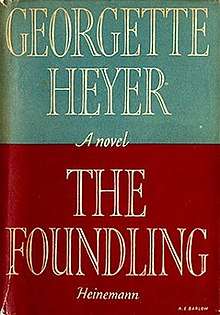The Foundling (novel)
The Foundling is a Regency romance novel written by Georgette Heyer.[1]
 First edition | |
| Author | Georgette Heyer |
|---|---|
| Country | United Kingdom |
| Language | English |
| Genre | Regency, Romance |
| Publisher | William Heinemann |
Publication date | 1948 |
| Media type | Print (Hardback & Paperback) |
| Pages | 432 pp |
| Preceded by | The Reluctant Widow |
| Followed by | Arabella |
Plot summary
The Duke of Sale is tired of being the Duke of Sale. He just wants to be a nobody from "Nowhere in Particular". He lives with his uncle, Lord Lionel. Lord Lionel and his team of servants baby the Duke and treat him like a child, when in reality he is almost twenty-five years old. The Duke does not want to be forced into marriage or be told what to do. He sets out on a wild adventure to find out who he really is.
The Duke is encouraged by his cousin Gideon to set out on the adventure and to avoid his posse of servants. A bit later, he is driving a gig to find a low thieves den called the Bird in Hand, when he sees a teenage boy who is hurt, stumbling down the road. Tom becomes a friend and nuisance to the Duke for the rest of the novel.
He soon finds out his other cousin Matthew is in a bit of a fix. Matthew supposedly sent letters to a very beautiful foundling named Belinda, and promised to marry her. When he decided not to marry her after all, her "guardian", Mr. Leversedge, blackmailed Matthew by letter. The Duke pretends to be Matthew and goes to deal with the guardian at the Bird in Hand but gets kidnapped. The Duke then has to figure out how to get Tom and Belinda safely home and out of trouble. He also has his own problems to worry about, including his fight with Lord Lionel and his impending marriage with Lady Harriet.
In the end, the Duke accepts his marriage to Harriet, discovering that he truly does love her. Belinda, who is the naïve foundling who only cares about a diamond ring and purple dress, also finds her true love.
References
- "The Foundling". www.penguin.co.uk. Retrieved 23 July 2019.